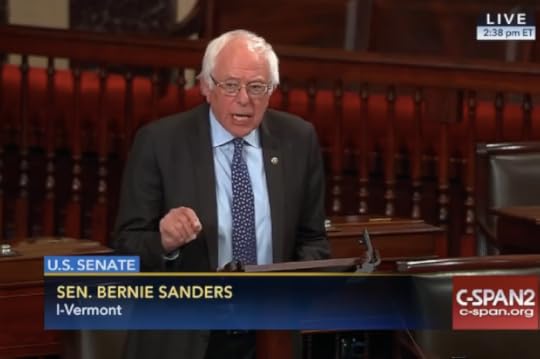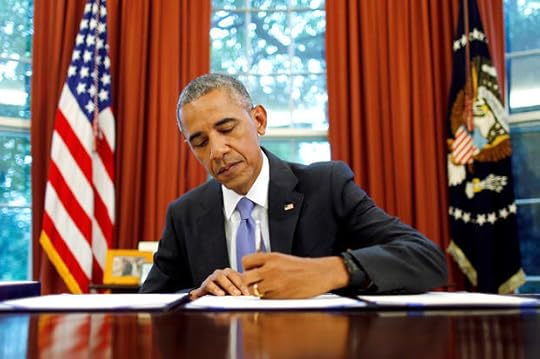Helen H. Moore's Blog, page 731
July 2, 2016
Brexit broke my heart: I’m British, Spanish and now completely lost

(Credit: AP/Matt Dunham)
 On Friday I awoke to a swift punch to the stomach. The assault had flown all the way from Britain to land in my unsuspecting gut in Barcelona.
On Friday I awoke to a swift punch to the stomach. The assault had flown all the way from Britain to land in my unsuspecting gut in Barcelona.
I had gone to sleep the night before quite confident that sanity would prevail and the status quo would be maintained. But as the UK’s European Union referendum result sank in, my depression worsened. It was a hangover but with no booze, a sense of bewilderment that I soon found out was shared by most of my family.
Let me explain: I was born in 1973, the son of a Spanish father and an English mother. Two years later, Spanish dictator Franco died and the UK joined the European Economic Community — an ancestor of the EU.
It would take another 11 years before Spain was welcomed into the European club.
On a personal level, being a mongrel of two different cultures basically means you have to behave like a divorced child: mentally defending the absent parent even when you know they’re partially guilty. In other words, being called “inglesito de mierda” (“shitty little English kid”) in the Spanish playground or getting told to “f— off back home!” on the streets of England when spending holidays with my grandparents.
This was Spain: a new democracy, lots of old fascists, a crumbling economy and, in my eyes, a cultural desert. For me, Spain was a country full of angry men who were afraid of change, always with a hint of violence if things didn’t go their way. What was there not to like?
England was something else. The yobs who had so adroitly invited me to leave their country were present in all my visits to my mum’s homeland, but their presence was balanced with the wonderful things I discovered in the UK. A sense of humor, a capacity for real debate, a sense of civic duty and groundbreaking television (plus, their TV was and still is commercial free!) These were all commodities that could not be found in even the shadiest black market in Spain. (Remember, this was eons before the internet blew our minds.)
So it was quite natural that I drifted toward anglophilia. I set out to collect English literature, TV, cinema, anything to line the dreariness of my Spanish education.
As I visited England over the years, I tried not to notice the other half of my other half: hooligans, vandalized train stations, an aggressive undercurrent that was present in any British night out.
It was quite a long time before I started hearing about euroskepticism. I think it wasn’t until the late Margaret Thatcher years, or possibly under her successor John Major, that I first heard people from their Conservative Party raging against a bureaucratic monster named Brussels. That was absolutely baffling from my perspective. Joining the European Economic Community, in 1986, was a moment of national relief in Spain, one of the few moments when we believed that we could hold our head high when visiting our northern neighbors.
The Spanish economy has grown considerably over the past 30 years. And Europe has played an important part. But we could not help ourselves. There was a reckless use of European tax money for ridiculous projects throughout Spain. When the economic crisis hit Europe, it didn’t take long for northern countries — the UK very much included — to inspect more carefully the way their money was being invested in the south.
This climate was something I noticed when visiting England. And I found myself apologizing for things that had nothing to do with me and didn’t benefit me at all. Even if there was general commiseration, it wasn’t difficult to perceive that patience was running thin. So thin, in fact, that what I initially thought of as a vague electoral promise finally came to be: Britain would vote on remaining in the EU.
And back to Friday, to the rude awakening. To be honest, I surprised even myself with the wave of sadness that I felt upon learning about the results. In a strange game of halves, Britain (or rather, England and Wales) had reared its ugly, xenophobic head and it had devoured the gentleman’s head it shared a body with. This led me to feel disconnected with what I had always considered to be my better, civilized half. It was always comforting to think that I could escape to the UK if Spain became particularly unbearable; now it turns out that the UK has escaped from me.
July 1, 2016
U.S. claims drones only killed 116 civilians; experts say it’s way more

A Yemeni man walks past graffiti denouncing U.S. drone strikes, painted on a wall in Sana'a, Yemen on Nov. 13, 2014 (Credit: Reuters/Khaled Abdullah)
According to the Obama administration, just 64 to 116 civilians have been killed in its secretive drone program.
The U.S. government published a report on Friday, July 1 that claims that the counter-terrorism airstrikes it conducted outside of conventional war zones between January 2009 and the end of 2015 only killed scores of non-combatants.
Experts say the number is likely much higher.
The report, issued by the Office of the Director of National Intelligence, analyzes 473 U.S. strikes in Pakistan, Yemen, Somalia and Libya, the vast majority of which were carried out by drones. It says 2,372 to 2,581 so-called combatants were killed in these attacks.
The U.S. government is not clear about how it defines combatant. The New York Times reported in 2012 that President “Obama embraced a disputed method for counting civilian casualties” that “in effect counts all military-age males in a strike zone as combatants, according to several administration officials, unless there is explicit intelligence posthumously proving them innocent.”
For years, the U.N., Amnesty International and Human Rights Watch have criticized the U.S. government’s secrecy in its drone assassination program, and have even implied that the Obama administration may be guilty of war crimes.
President Obama touted the report on Friday as a sign of his administration’s commitment to transparency. Yet scholars, journalists and human rights officials who have long monitored the drone program are worried that the investigation’s findings are drastically understated.
The Bureau of Investigative Journalism has been one of the leading forces in the documentation of drone casualties. In a statement, the organization noted that the U.S. government’s figures are a mere “fraction” of what its detailed research has found.
The organization used reports by local and international journalists, NGO investigations, leaked government documents, court papers and the results of field investigations to analyze the U.S. drone strikes that took place in this 2009 to 2015 period.
It found that at least 380 to 801 civilians were killed, several times more than the Obama administration’s 64 to 116 estimate. And this is still a conservative estimate, based primarily on cautious media reporting.
Salon reached out to Jack Serle, a reporter at the Bureau who specializes in the drone program.
“This data release is a welcome step towards greater transparency,” Serle said. “However, we still don’t have information on specific strikes, in particular several attacks that killed significant numbers of civilians, according to our monitoring. This makes it impossible to reconcile our civilian casualty figures with theirs.”
“The White House hasn’t even broken down the figures by year or by country, leaving us none the wiser as to how the drone war has progressed since the first strike of Obama’s presidency, on Jan. 23, 2009, killed at least nine civilians,” Serle added. The new U.S. president accepted his Nobel Peace Prize just the month before this attack.
The Bureau of Investigative Journalism published an article on Friday in response to the new report, detailing its findings and methodology and comparing them to those of the U.S. government.
Human rights officials
After the Office of the Director of National Intelligence released its report, President Obama also issued an executive order calling on the government to report on civilian casualties every year and to offer condolences to families hurt by U.S. strikes.
Human rights officials applauded the administration for the executive order, but still have numerous concerns.
Laura Pitter, senior U.S. national security counsel at Human Rights Watch, told Salon that she, too, is skeptical of the government’s casualty figures.
“It is very hard to assess the accuracy of their numbers because they are not broken down by year or even country,” she said.
“The U.S. has failed to explain who it targets and why, making it impossible to corroborate its casualty figures,” she added. “Unless details are provided on specific incidents, it’s not possible to determine if individuals killed were civilians, and thus whether the U.S. is complying with its own policy and with international law.”
Human Rights Watch conducted its own independent investigations into some of the U.S. drone strikes that took place in Yemen between 2009 and 2013, Pitter recalled. The human rights organization concluded that more than 50 non-combatants were killed in these attacks alone, and this is a conservative estimate based on only a portion of the U.S. drone strikes that took place in one country.
The vast majority of U.S. drone strikes have taken place in Pakistan, not Yemen.
Pitter also pointed out that the fact that the U.S. government is providing a large range of civilian casualties, and not a specific number, indicates that it itself is not even 100 percent sure.
“It is hard to put much stock in them,” she said.
Secret government documents leaked to The Intercept by a whistleblower show that, according to official figures, 90 percent of people killed in U.S. drone strikes in a five-month period in provinces on Afghanistan’s eastern border with Pakistan were not the intended targets.
The Obama administration’s new report excludes drone strikes conducted in “areas of active hostilities” such as Afghanistan from its figures.
Pitter did have some good things to say, nevertheless.
“The fact that the U.S. government going forward is making it policy to acknowledge these kind of strikes, outside areas of active hostilities, and provide compensation is extremely important,” she said. “They should have done that years ago.”
The Human Rights Watch expert called the decision “a long-overdue step toward greater transparency.”
Naureen Shah, director of Amnesty International USA’s Security and Human Rights Program, likewise told Salon that the U.S. report “is really important.”
The Obama administration’s secrecy has been “damaging and dangerous,” she said.
The U.S. is the first government in the world to use lethal drones on a wide scale, Shah stressed.
“We still have fundamental questions about the basics of those numbers,” she continued, expressing concern about how low they are. “But it’s hard to reliably have that information.”
Transparency?
Some observers, however, say the U.S. report amounts to little more than window dressing, and does not represent a real commitment to transparency.
For starters, the Obama administration released the report on the Friday before the July 4 three-day weekend.
Journalist Spencer Ackerman, who has reported on the U.S. drone program for years, quipped on Twitter, “Nothing says transparency like saying you killed between 64 and 116 civilians (hundreds less than estimates) before July 4 weekend.”
At a deeper level, however, the report’s diminutive findings and its failure to disclose methodology may themselves betray the U.S.’s professed commitment to transparency.
“The U.S. government’s estimate of civilian casualties is misleading at best and, at worst, a distortion of the reality on the ground,” said Omar Shakir, a legal expert who has extensively studied the U.S. drone program.
Shakir told Salon that he feels the report, in reality, continues to shroud the drone program in secrecy and fails to provide a basic accounting of U.S. policies.
“There is strong evidence that the numbers are significantly higher than what the U.S. has said,” noted Shakir, who is currently a fellow at the Center for Constitutional Rights.
The report “raises serious questions about how the U.S. classifies individuals as combatants and non-combatants,” he added.
“Nobody should mistake this for an exact figure.”
Shakir is a co-author of “Living Under Drones,” a joint study conducted over nine months by the law schools at Stanford University and New York University.
The intensive 2012 report found that the U.S. drone program had killed hundreds of civilians in Pakistan, and “cause[d] considerable and under-accounted-for harm to the daily lives of ordinary civilians, beyond death and physical injury.”
It noted that the U.S. has conducted drone strikes on rescuers who were trying to help people hit in previous attacks, making “both community members and humanitarian workers afraid or unwilling to assist injured victims.”
Amnesty International’s Naureen Shah stressed to Salon that the human rights organization also documented these double-tap strikes in its investigations.
“Living Under Drones” concluded that the U.S. drone program has “terrorize[d] men, women, and children, giving rise to anxiety and psychological trauma among civilian communities.”
In the report, Shakir said he and the other scholars who studied U.S. strikes found that the methodology of the Bureau of Investigative Journalism was “the most comprehensive and thorough.”
Even then, however, the Bureau’s reporting was still conservative, Shakir noted. The “Living Under Drones” fact-founding team on the ground found strikes that resulted in civilian casualties that the Bureau missed.
“Unfortunately, the way this campaign has been conducted in the shadows really prevents people from having a real sense of exactly how many people have been killed,” he said.
Shakir underscored the fact that investigations aren’t conducted after U.S. drone attacks, and operators themselves can’t make determinations of casualties.
“It is not a step toward transparency,” he said. The new report “maintains the same line: just trust us.”
Scholars and journalists have long expressed concern that U.S. drone strikes do more damage in the long-run, by fueling extremism in communities affected by the attacks.
Pakistani-American scholar Hassan Abbas is one of many experts who have argued that the U.S. drone program creates more extremists than it kills.
Even the head of intelligence for the Joint Special Operations Command, or JSOC, the U.S. military unit that oversees the drone program, has admitted that it creates more extremists than it kills.
“When you drop a bomb from a drone… you are going to cause more damage than you are going to cause good,” Michael T. Flynn warned. The retired Army lieutenant general, who also served as the U.S. Central Command’s director of intelligence, says that “the more bombs we drop, that just… fuels the conflict.”
Renowned public intellectual Noam Chomsky has characterized the U.S. government’s secretive drone assassination program as a massive and illegal campaign of global terrorism.
Exile in political Guyville: Why getting Hillary Clinton elected isn’t “women’s work”

Hillary Clinton (Credit: Reuters/Jason Miczek)
As the election between Hillary Clinton and Donald Trump shapes up, we continue to see Clinton and the women who are supporting her exiled (with apologies to Liz Phair) in Guyville. As presumptive nominee Clinton says about this historic election, “This campaign is about making sure there are no ceilings, no limits on any of us and this is our moment to come together.” Yet, we are not all coming together. Bernie Sanders has not withdrawn, despite Clinton’s securing the delegates to win the nomination. Twenty-two percent of Sanders supporters say they’d rather vote for Trump than Clinton. Male Sanders supporters continue to troll and threaten Clinton supporters and the media covering her.
Clinton’s imminent nomination is a huge step for women and for feminism, and feminism is part of a progressive agenda. But you wouldn’t know it in Guyville, where white men continue their long history of failing to fight for feminist advances. Even among those white men who do support Clinton, there is a pronounced lack of enthusiasm and activism. Hillary seems to be left to be elected by everyone but them.
According to NPR, the gender gap could be the largest it has been in any modern election. In what is shaping up to be a “titanic clash of the sexes,” 54 percent of female voters prefer Clinton, while only 35 percent of male voters do. Even male progressives lag, despite that this election is a referendum on a wide agenda of imperative concerns and there is good cause for all progressives to be excited by the prospect of Clinton’s nomination. She is not a perfect candidate. No one is. Writer Brittney Cooper makes the point, “I also don’t believe that we can claim to support a progressive agenda if we have not empirically proven that we trust a woman to lead our country or that we will support one.”
In 2012, 72 percent of Democratic women voters identified as feminists, but only 40 percent of Democratic men voters did. Last year, among millennials, 62 percent of Democratic women identified as feminists but only 32 percent of Democratic men. I spoke to Eleanor Smeal, president of the Feminist Majority Foundation, about the gender gap and the upcoming election. For more than 30 years, Smeal has been on the front line of virtually every women’s rights victory. She asks, “How can you call yourself a progressive if you aren’t standing for women? More and more progressives of all genders are realizing that this is true.” She points out, “That’s part of why we are seeing the number of those self-identifying as feminists climbing,” despite the disparity between the genders in doing so.
Yet we still live in paternalistic, patriarchal Guyville, full of men who will happily mansplain to you about electoral politics and why Hillary is a bad idea. In her piece for Slate, “Men Explain Hillary to Me,” Michelle Goldberg laments that the Sanders campaign has, “…unleashed a minor plague of progressive white men confidently explaining feminism to the rest of us.” She adds, “They seem to believe that their class politics exempt them from taking sexism seriously. They certainly don’t care about female leadership.” In New York Magazine, Rebecca Traister writes, “It’s not just what the progressive guys say about Clinton, her supporters, or feminism itself, it’s also what they don’t say. Where are the fierce male Hillary critics grappling with any anxiety about two centuries of all-male executive power in a country that is 51 percent female and in which women’s bodies are heavily patrolled by federal and state legislation?”
This is not post-feminist America. Millennial men turn out to be just as sexist as the generation of men before them, and men remain on the sidelines of most feminist battles. Twice as many women as men identify as feminists, and feminist women do not demand men join them, even as we dream of a righteous world for our children. Why are we OK with letting our progressive brothers have a pass?
What if we didn’t? What if we said we would not enter into partnerships, have sex with, or socialize with, men who weren’t active feminists? I still believe the greatest weapon of the oppressor is the complacency of the oppressed. Why are we not openly outraged that men seem to be yawning on the sidelines as we work to elect the first woman president?
Clinton, as has been pointed out in countless reports, “…has struggled in many ways to generate enthusiasm and excitement about her candidacy, even though electing a woman to the White House for the first time would be a momentous historical occasion.” This problem comes in large part from a failure of progressive men to embrace and work toward feminist goals. Transformation of the power structure — which we’ve heard a lot about this election year — must include electing a woman president.
This is about the election, but more broadly it is about calling men to be as active in and committed to their feminism as women are. That means: identifying openly as intersectional feminists, voting a feminist agenda, supporting feminist causes, beating back sexism. This is not women’s work. This is everyone’s job.
Eleanor Smeal is hopeful and confident that the gender gap will close. “In this election, more and more progressive men will move in Hillary’s direction in response to the misogyny and extremism of the right-wing and Donald Trump,” she says. I hope she’s right.
It’s not that Hillary has a man problem, it’s that feminism has a man problem. John Sides at the Washington Post debunked the myth that there was a huge generational divide between Clinton and Sanders supporters. As Amanda Marcotte wrote for Salon in December, “The Bernie bro phenomenon of young men whose enthusiasm for socialism is goosed by an unacknowledged sexism appears to be a real, measurable phenomenon…the gap between young men and young women does suggest, though I’ll get no end of grief for saying this out loud, that a chunk of Sanders support with his young male cohort comes from guys who really don’t cotton well to the idea of women in power. … The problem, in other words, isn’t that young women aren’t feminist enough. The problem is that young men aren’t feminist enough.”
The argument that male complacency can be blamed on Clinton being the wrong female candidate does not stand up when you consider that progressive women in every cohort largely support her. These women are not as a group ideologically different than their male counterparts, not intrinsically less liberal, more hawkish, less concerned about her Wall Street ties. So, what is causing that gender divide? Don’t we somehow expect men to be less on board with feminism than women? Isn’t that wrong and misguided of us?
The suffragists, for example, knew that men — the only ones in power — had to come on board with them in order to realize their cause. Likewise the abolitionists and the civil rights activists knew that the white power structure was going to have to join them in their battles. Beyond a moral imperative that should call men to feminism for the sake of justice, don’t feminist women today need men to join us in our struggles? Of course we do.
When we elected President Obama, more than two-thirds of the country saw it as one of the top three advances for African-Americans in the past century. Wouldn’t electing Clinton be, along with suffrage and reproductive choice in the form of birth control and abortion, one of the top three advances for women in the last hundred years? For most of us, this is one of the two biggest — if not the biggest — feminist moments of our lifetime, along with the Roe v. Wade decision to legalize abortion. Overwhelmingly, men were not marching with women then, and they are not fighting for Hillary now, but they should be. What does it even mean to be progressive if you are not fighting for the rights of 51 percent of the population?
Marcotte states it well when she asserts, “plenty of men with otherwise impeccable progressive politics have a special carve-out for women, who they still regard as a secondary class who are here to serve men and not to compete with them…on the scale of feminism, women are way ahead of the curve. It’s time for men to start playing catch-up.”
To be clear, this is not women’s work either, to engage men in feminism. It is up to men to ask themselves why they are not as excited as women are about this moment. Women should not need to have a conversation with them in 2016 about how to get them more excited about equality. Our expectation as feminists should be that to call yourself a progressive you must be intersectional — working to dismantle racism, classism, sexism, homophobia and all forms of bigotry — and to do less than that is to be a bigot. It’s a hard line, yet necessary. We should turn our backs on men who aren’t feminists, because men who aren’t feminists are sexists.
Women should demand more. Half a century of asking men to join us and hoping they will or ignoring them altogether has not seen us achieve our feminist goals. And what we know is that it is only when the oppressor joins the fight does the structure change. We make a mistake to say, “We can’t demand it, we need them to come to this on their own.” In significant numbers, they aren’t, they don’t, they haven’t. Time to shun the men who aren’t feminists. Further, it’s easy enough to say, “feminism isn’t even about men.” Sure. Like anti-racism isn’t about white people?
It’s time for feminist women to call bullshit.
We must all work to defeat Donald Trump for the good of the country. He is a man of fear and hate and that is what he stirs in his supporters. The country Trump’s acolytes want is not a beautiful one, it is not a righteous country, it is not my country — but if they win it will be the country we have.
This is the election that separates not only progressive values from hate, but feminist men from sexist men. Hillary Clinton stands on one side of that divide. I expect men to cheer her. I expect women to demand they do.
And then, together, we can all watch Donald Trump get beat by a girl.
“Pat the Bunny” is kind of twisted and other lessons I learned from picture books

Something happens when you have a baby, and it’s not an event that pediatricians or parenting books prepare you for. At some point during the first six months, you begin to internalize the language and lessons of the books you are reading aloud every day. Unless you have undertaken serious religious study, this is probably the first time you will engage in the ritualistic rereading of a small group of texts. The messages may be designed for kids. But they’ll change you, too.
Take, for instance, a book called “That’s Not My Panda.” It takes as its premise the possibility that one could have so many pandas that a process of elimination is required to identify which one is yours. Using criteria not dissimilar to those employed in reality-TV competitions (nose smoothness, back fuzziness), the book arrives finally at the answer: “That’s my panda!” Yet more instructive may be the lesson gleaned from the previous pages — that many of the metaphorical “pandas” you’ll encounter in the board book of life will be, emphatically, not yours. As a mantra it proves surprisingly useful. Confronted with troublesome coworker? A show you don’t like? Not your panda.
It’s an example of how what might seem like a throwaway line can, over time, take on greater meaning. This is not coincidental. Like pop songs, picture books are full of hooks, phrases so insidious that even the simplest can start to seem replete with gnomic intention. Whatever your feelings about Sandra Boynton, it is hard to deny the rhetorical power of her hymn to sleepwear, “Pajama Time.” Finally, someone has furnished the English language with a phrase to signify that moment in the day when it’s clear no one will be leaving the house: “It’s pajama time!/ Ooh yes,/ pajama time!”
Equally instructive is Helen Oxenbury and Michael Rosen’s classic picture book, “We’re Going on a Bear Hunt.” In it, a family sets out in search of the titular bear, encountering inhospitable terrain and freak weather events along the way. Now, when faced with seemingly insuperable obstacles, I mentally resort to the book’s refrain: “We can’t go over it. / We can’t go under it. / We’ve got to go through it!”
Sometimes the lessons are gentler. In “Pouch,” a young kangaroo ventures progressively further from his mother on hopping excursions, though he continues, periodically, to seek out marsupial sanctuary. “Pouch!” he yells, whenever encounters with Australian wildlife prove overwhelming. Who among us has not longed for similar refuge after a long day of adulting?
At other times, however, the takeaways from the toddler library are more dubious. Consider Alice Schertle’s “The Little Blue Truck.” In it, the formerly imperious dump truck — humbled after a detour in the mud — experiences an epiphany: “[n]ow I see a lot depends / on a helping hand from a few good friends.” It seems like an unimpeachable exemplum. Yet disturbingly, this “helping hand” only arrives once the little blue truck has leveraged its social capital; until then, the animal corps of truck-pushers stands by, ignoring the dump in its hour of automotive need. In short, there’s a creepy tribalism at work, which puts one in mind less of the golden rule than the ethos on display in Tod Browning’s “Freaks”: that we owe our loyalty only to those who qualify as “one of us.”
Then there’s the putatively progressive teaching of Mem Fox’s “Ten Little Fingers and Ten Little Toes.” The book starts by advocating for an admirable if ingenuous color-blindness, suggesting that our shared number of digits reflects a common humanity. But this universalism is undercut in the book’s final pages, by the arrival of a baby who is “truly divine, / a sweet little child who is mine, all mine.” So which is it: Are we all the same, or are a few of us actually special snowflakes?
I was surprised to find that some of the darkest messages emerged from a book I remembered fondly: “Pat the Bunny.” What I did not recall were the disturbingly Oedipal fantasies that circulate within it. In its brief span, Dorothy Kunhardt’s bestseller asks you to adopt the persona, first, of a little boy, who “puts his finger through Mummy’s ring,” and then, a little girl, stroking her father’s five o’clock shadow.
In case anyone suspects over-reading, it’s worth noting that picture books have come in for increased scrutiny in recent years. Yale professor Paul Fry has taught a literary theory class using “Tony the Tow Truck,” while a well-known parenting blogger recently published a masterly deconstruction of “Good Night, Moon.” (It notes, among other things, the oddness of having a “black office telephone” beside the little rabbit’s bedside: “Who’s calling, his financial adviser?”) Providing further ballast: a 2012 study entitled, “Have a Carrot: Hidden Messages in Margaret Wise Brown’s Runaway Bunny Trilogy and Other Popular Picture Books.” On the popular front, Adam Mansbach’s “Go the F*ck to Sleep,” while appearing to provide a light-hearted outlet for parental frustration, also parodies the soporific trajectory of practically every story written for kids under five: something exciting happens, it ends, and then everyone has to go, you know, to sleep.
What seems less recognized, however, is that picture books are not only efficient conveyers of ideologies, but that many have been shaped by publishers eager to ensure the ideas they deliver are “correct.” Eric Carle, for instance, has complained that he was pressured to add the penitent coda to his hungry caterpillar’s week-long binge: on Sunday, “he ate through one nice green leaf and after that he felt much better.” As Carle explained to “The Paris Review,” “[i]ncluding the punitive stomachache ruined the effect. It compromised the book… I see children doing what they like, which is eating, and doing it without the shame or remorse later drilled into them by Judeo-Christian ethics.” Similarly, when “Goodnight Moon” author Margaret Wise Brown was asked by her publishers to change the ending of “The Runaway Bunny,” she responded with the following punch line: “Have a carrot.”
This brief survey excludes books with far more obviously objectionable content: “Little Black Sambo,” say, or “The Five Chinese Brothers.” Just this January, author Malcolm Jones wrote an article detailing the “unbelievably racist world of classic children’s literature” — a tradition for which the publishing industry, he points out, has worked strenuously to atone. Yet even the most “achingly forward thinking and politically correct books,” to borrow Jones’s phrase, can harbor ideas we don’t want to endorse. Didacticism doesn’t guarantee the lesson being taught is right. It’s nice to learn something from picture books. But we shouldn’t have to.
Britain soldiers on, bakes off: “Great British Baking Show” projects a happier image for fans

If you’re worrying about the soul of Britain now — ponder how a supposedly civilized country could vote out of xenophobic rage to cut its own throat – this may calm your fears. The United Kingdom may be heading into a nightmare of regret and economic recession, but if you keep your television set to this program instead of the news, all will seem to be well.
With “The Great British Baking Show” (known as “The Great British Bake Off” in its home country) one of the most important parts of the nation’s experience is made available to us: A dozen bakers assemble in a manor, located in a rural part of Berkshire, to all try their hands making the same dessert for two judges, with a host alongside. PBS debuts its third season tonight (this season aired in 2015 in the UK).
Warning: Mild season premiere spoiler ahead (no outcomes revealed). U.S. viewers, stop reading if you want to be completely surprised.
Americans have generally entertained a series of stereotypes about the British, and movies and television that cater to those stereotypes tend to get traction here. For a long time we thought of the Brits as aristocrats; Swinging London and punk associated Britain with rock music and fashion and boundary-pushing. The last few decades have made clear that Britain is also a nation of bankers.
The coverage of Brexit has included views of rural and small-town Britain, much of which has not recovered from the Great Recession, where resentment of immigrants and the nation’s growing multicultural reality absorbs their well-grounded frustration with the economic order.
But what we see in the show is a patch of Britain that doesn’t normally end up in TV or movies or in celebrity culture. “The Great British Baking Show” does not contain any real xenophobia, any serious aristocracy, or much that’s uber-hip. Instead, its contestants tend to be mild, suburban, middle-class.
And why doesn’t it get that much media attention, despite its obsessive fans? It’s fairly dull. There’s not much conflict. The judges are polite as they talk about the ideal “proper” version of the dessert du jour and how the examples do and don’t match up. But somehow this show ends up being tremendously popular over here.
They’re not all likable – there’s something smug about the aptly-named judge, chef Paul Hollywood. But it’s all pretty mild. No one explodes. No one fights back from a sharp insult. The harshest comments involve a contestant’s flavors not being well balanced.
The show has none of the swagger of most American cooking shows like “Iron Chef America,” with its quick cutting, macho posturing, surging music, and samurai-inspired knifeplay. (“Are you ready for 60 minutes of culinary conflict?”) There’s none of the S+M-style savagery, the trash-talking, the financial stakes, or the cult of personality of “Hell’s Kitchen.”
The first episode’s opening challenge involves a particularly traditional English cake, dating back hundreds of years, that is often served with tea. Mostly butter, sugar, and eggs, this dessert doesn’t need much. But its simplicity means it can be played straight, or embellished as baker sees fit, and the participants, in their variations, show how a multicultural vision of Britain can co-exist.One woman, an amateur body-builder, hails from Lithuania. A tattooed musician in a trendy hat and nose-ring politely laments his critical reception from the judge. London firefighter Matt puts a particularly English innovative twist on his entry; while Dorret, an Englishwoman of West Indies heritage, makes hers traditional. Nadiya, who wears a hijab, uses an unexpected spice. Other incorporate figs, blood oranges, apricot.
“This is the bit that could go horribly wrong,” Nadiya offers, while executing a tricky portion of her dessert.
The same could be said for Britain itself: Brexit could be a disaster. But on “The Great British Baking Show,” it never does. Anarchy in the UK may lead this show to become even more popular for those who want to remember Britain as it was.
Pro-Clinton super PAC forced to return banned donations as the campaign announces massive June fundraising haul

Hillary Clinton (Credit: AP/Jim Cole/Shutterstock/Salon)
After becoming the presumptive Democratic presidential nominee at the close of the final primary polls earlier this month, Hillary Clinton proceeded to rake in the biggest fundraising haul of her campaign thus far.
The Clinton campaign announced on Friday that it had raised more than $68.5 million for Hillary for America, the Democratic National Committee (DNC) and state parties in the month of June. Clinton’s campaign now enters July in a dominant financial position, with $44 million on hand after a total haul of about $288 million raised throughout the primary, the campaign announced in a statement.
$40.5 million of June’s massive haul went directly to the campaign, while the remaining $28 million went to the DNC and state parties through the Hillary Victory Fund and the Hillary Action Fund, brining Clinton’s total joint fundraising to around $90 million.
“Our first month of general election fundraising proved to be the best of the campaign,” campaign manager Robby Mook said.
According to her campaign, the average Clinton donation was $48.
But while things are clearly going swimmingly in the fundraising department of the Clinton headquarters, the same can’t be said for the largest super PAC supporting her.
Priorities USA announced on Friday that it had returned $200,000 in contributions from a company that had contracts with the federal government, The Hill, which first discovered the banned donation. The Hill found that Suffolk Construction had given $200,000 to Priorities, while, according to USAspending.gov, holding multiple contracts with the Department of Defense worth $976,560.
Meanwhile, Donald Trump’s campaign has still not reported it’s fundraising numbers for June, after raising a paltry $3.1 million the month he clinched the Republican nomination. Entering June, in fact, Trump had an embarrassing $1.3 million cash on hand.
This, as he fired his campaign manager, hired and then watched as new campaign staffers quit within weeks, and generally failed at any attempts to “pivot” towards the general election.
WATCH: Sanders blasts “colonial” Puerto Rico bill and Wall Street vulture funds in powerful Senate speech

Bernie Sanders speaking on the Senate floor against the PROMESA bill on Wednesday, June 29, 2016 (Credit: C-SPAN)
President Obama signed a bipartisan bill on Thursday that imposes what critics say is a “colonial” control board on Puerto Rico.
The Puerto Rico Oversight, Management and Economic Stability Act, or PROMESA, was largely supported by both the Republican and Democratic parties, and will allow the U.S. federal government to appoint an unelected seven-member board that controls the finances of Puerto Rico, a U.S. territory.
Sen. Bob Menéndez led the opposition to the bill, slamming it as a form of “blatant colonialism.” He held a four-hour filibuster on Tuesday, June 28, stressing that a vote for PROMESA “is a vote to disenfranchise 3.5 million Americans.”
The vast majority of Puerto Ricans opposed the legislation, but it passed both the U.S. House and Senate by substantial margins.
Democratic presidential candidate Hillary Clinton has previously expressed support for the colonial-style bill.
Clinton’s opponent, Vermont Sen. Bernie Sanders, slammed PROMESA in a heated speech on the Senate floor on Wednesday, June 29.
He called it a “disaster for the people of Puerto Rico,” adding, “This legislation takes away their democratic rights and self-governance and will impose harsh austerity measures, which will make the poorest people in Puerto Rico even poorer.”
PROMESA makes the U.S. a “colonial master,” Sanders continued, and “strips away the most important powers of the democratically elected officials of Puerto Rico.”
The self-declared democratic socialist stressed that Wall Street vulture funds are profiting off of odious debt that is “unsustainable and unpayable,” exploiting Puerto Rico’s “human suffering and economic turmoil.”
Watch Sanders’ remarks below:
A transcript of Sen. Sanders’ speech follows:
“I rise in very strong opposition to the Puerto Rico Oversight, Management, and Economic Stability Act, the so-called PROMESA Act. This is a terrible piece of legislation, setting horrific precedent, and it must not be passed.
The United States of America should not treat Puerto Rico as a colony. We cannot and must not take away the democratic rights of the 3.5 million Americans of Puerto Rico and give virtually all power on that island to a seven-member board that will be dominated, as it happens, by four Republicans.
This legislation strips away the most important powers of the democratically elected officials of Puerto Rico, the Governor, the Legislature, and the municipal governments as well. We must not allow that to happen.
This is not what the United States of America is supposed to be about, and this is not how we should treat a territory in the year 2016.
The bottom line is that the United States must not become a colonial master, which is precisely what this legislation allows.
Any decisions that are made regarding the future of Puerto Rico must be made by the people of that island and their elected officials.
This legislation, I should add, is not just about taking away the democratic rights of the people of Puerto Rico. It is about punishing them economically.
Since 2006, Puerto Rico has been in the midst of a major economic depression. In the last 10 years, Puerto Rico has lost 20 percent of its jobs. About 60 percent of Puerto Rico’s adult population is either unemployed or has given up looking for work.
Over the last 5 years alone, more than 150 public schools have been shut down and the childhood poverty rate in Puerto Rico is now 58 percent.
There is a mass migration out of Puerto Rico to the mainland of professionals because there is simply no work on the island.
In the midst of this human suffering and economic turmoil, it is morally repugnant that billionaire hedge fund managers on Wall Street are demanding that Puerto Rico fire teachers, close schools, cut pensions, and lower the minimum wage so that they can reap huge profits off the suffering and misery of the American citizens on that island.
We have to understand that Puerto Rico’s $70 billion in debt is unsustainable and unpayable. That is just a fact. You cannot get blood out of a stone.
The reason — or one of the major reasons that it is unpayable — has a lot to do with the greed of Wall Street vulture funds. In recent years, vulture funds have purchased a significant amount of Puerto Rico’s debt. In fact, it has been estimated that over one-third of Puerto Rico’s debt is now owned by these vulture funds that are getting interest rates of up to 34 percent on tax-exempt bonds they purchased for as little as 29 cents on the dollar.
Let me repeat that. Vulture funds are getting interest rates of up to 34 percent on tax-exempt bonds they purchased for as little as 29 cents on the dollar.
Let us be clear. This issue is a significant part of what the entire debate regarding Puerto Rico is about. Billionaire hedge fund managers who purchased Puerto Rican bonds for pennies on the dollar now want a 100 percent return on their investment, while schools are being shut down in Puerto Rico, while pensions are being threatened with cuts, while children on the island go hungry.
That is morally unacceptable. That should not be allowed by the Congress.
It is bad enough for Republicans in the House to write legislation that takes away the democratic rights of U.S. citizens living in Puerto Rico, but adding insult to injury, this legislation does something even more insulting.
At a time when health, education, and nutrition programs will likely be cut, this legislation, if you can believe it, requires the taxpayers of Puerto Rico to pay for the financial control board at the unbelievable sum of $370 million in order to fund the control board’s bureaucracy.
So think about it for a second. The control board will likely cut programs for the elderly, the children, the sick, and the poor, on an island where 58 percent of the children are already living in poverty because Puerto Rico does not have enough money to take care of its most vulnerable people.
In the midst of all that, $370 million is going to be sucked away from Puerto Rico in order to pay for the administration of the financial control board. This, to me, is literally beyond belief.
Puerto Rico must be given the time it needs to grow its economy, to create jobs, to reduce its poverty rate, and to expand its tax base so that it can pay back its debt in a way that is fair and just.
In my view, we need austerity — not for the people of Puerto Rico but for the billionaire Wall Street hedge fund managers who have exacerbated the financial crisis on the island.
We must tell them loudly and clearly that they cannot get everything they want while workers in Puerto Rico are fired, while schools are shut down, while health care is underfunded, and while children on that island live in poverty.
I am very disappointed that this extremely important piece of legislation is being pushed through Congress without allowing any amendments here in the Senate. That is not the way we should be doing business. If allowed, I will offer an amendment in the form of legislation that I have introduced — legislation that would allow Puerto Rico’s debt to be structured through the creation of a reconstruction finance corporation.
Let’s never forget that in 2008, when Wall Street’s greed, recklessness, and illegal behavior nearly destroyed our economy, the Federal Reserve provided $16 trillion in virtually zero — zero — interest loans to every major financial institution in this country, as well as central banks and corporations throughout the world.
If the Federal Reserve and the Treasury Department could move quickly to stabilize our economy and global markets in 2008, we can surely help the 3.5 million American citizens in Puerto Rico who are hurting today.
The Fed can and should provide low-interest loans to Puerto Rico and facilitate an orderly restructuring of Puerto Rico’s debt.
This legislation is both a political and economic disaster for the people of Puerto Rico.
This legislation takes away their democratic rights and self-governance and will impose harsh austerity measures, which will make the poorest people in Puerto Rico even poorer.
This is legislation that should not be passed by the Congress.”
Hillary’s holiday plans: FBI will reportedly interrogate Clinton over long weekend

(Credit: Reuters/Jim Young)
Democratic nominee Hillary Clinton is scheduled to meet with FBI officials Saturday, says “a source close to the investigation” who tipped off The Daily Caller.
The meeting will reportedly pertain to Clinton’s alleged misuse of a private email server — located at her home in Chappaqua, New York — to handle classified documents during her tenure as Secretary of State.
Several Clinton associates — including top aides Cheryl Mills and Huma Abedin — have already had to testify as a result of the FBI’s investigation.
“Scheduling the meeting on a holiday weekend will likely help with logistical issues for both the FBI and the Clinton campaign,” wrote The Daily Caller. “Clinton has no campaign events listed on her schedule which means that she will not be tailed by the usual pack of campaign reporters. The FBI has sought to avoid drawing attention to its probe by bringing in witnesses in secret.”
Read The Daily Caller’s full report here.
Critics say bipartisan bill signed by Obama imposes “colonial” control board on Puerto Rico, puts “hedge funds ahead of people”

Barack Obama signs into law the Puerto Rico Oversight, Management and Economic Stability Act, June 30, 2016. (Credit: Reuters/Carlos Barria)
A bipartisan bill signed by President Obama will impose a “colonial” control board on Puerto Rico, critics say.
Sen. Bob Menéndez slammed the legislation as a form of “blatant colonialism” that puts “hedge funds ahead of the people.” Bernie Sanders likewise condemned the bill as a “disaster for the people of Puerto Rico” that makes the U.S. the “colonial master” and takes away the Puerto Rican people’s democratic rights.
President Obama signed the Puerto Rico Oversight, Management and Economic Stability Act, or PROMESA, on Thursday night, hours before Puerto Rico was obligated to pay $1.9 billion of its $70 billion debt on a July 1 deadline.
Minutes after Obama signed the bill into law, Gov. Alejandro García Padilla issued an executive order authorizing suspension of payments on Puerto Rico’s debt.
PROMESA permits a debt restructuring process, similar to bankruptcy, but at a great cost: In return, the U.S. federal government will impose an unelected control board onto the U.S. territory. This board will control Puerto Rico’s finances, yet will consist of people who do not even live on the island.
The control board is likely to impose harsh austerity measures, including big cuts in social services, public institutions and pension funds.
PROMESA already forces the Puerto Rican government to reduce the minimum wage to $4.25 an hour for people under 25, while 45 percent of Puerto Ricans live in poverty and 60 percent of adults are unemployed.
The Senate passed PROMESA on Wednesday, June 29 by a 68-to-30 vote.
Democratic presidential candidate Hillary Clinton has previously expressed support for the colonial-style bill. Her opponent, Bernie Sanders, has vehemently opposed it.
Menéndez, who led the opposition to the bill, and proposed 30 of its 68 amendments, held a four-hour filibuster on the Senate floor on Tuesday. Sanders joined him in the filibuster.
This “is a vote to disenfranchise 3.5 million Americans,” Menéndez said. He stressed that, contrary to what the Obama administration and Congress have claimed, the people of Puerto Rico are overwhelmingly against the bill.
Menéndez cited a poll that found that a staggering 69 percent of Puerto Rican voters oppose PROMESA.
Activists in Puerto Rico aggressively protested the colonial-style legislation. Demonstrators created a long-term protest camp outside of the U.S. federal courthouse in Hato Rey, Puerto Rico.
On the Senate floor, Menéndez listed off a long series of negative impacts the bill will have on the U.S. territory:
“It is a vote to authorize an unelected, unchecked and all-powerful control board to determine Puerto Rico’s destiny for a generation or more.
It is a vote to authorize an unelected and all-powerful control board that could close schools, shutter hospitals, and cut senior citizens’ pensions to the bone.
It is a vote to force Puerto Rico, without their say, to go $370 million further in debt to pay for this omnipotent control board which they don’t even want.
It is a vote to cut the minimum wage down to $4.25 per hour for younger workers in Puerto Rico.
It is a vote to make Puerto Ricans work long overtime hours without fair compensation or protection.
It is a vote to jeopardize collective bargaining agreements.
It is a vote to cut worker benefits and privatize inherent government functions.
It is a vote to place well-heeled hedge funds and creditors ahead of the people.
It is a vote to give the board the power to sell off and commercialize natural treasures that belong to the people of Puerto Rico.
And at its worst, it is a vote to authorize an unelected, unchecked and all-powerful control board that determines Puerto Rico’s destiny for a generation or more.”
Sanders also vociferously opposed the legislation, railing against it on the Senate floor.
In another article, Salon featured a video and transcript of Sanders’ powerful Senate speech.
“This is a terrible piece of legislation, setting horrific precedent, and must not be passed,” he said, adding, “the United States of America should not treat Puerto Rico as a colony. We cannot and must not take away the democratic rights of the 3.5 million Americans of Puerto Rico and give virtually all power on that island to a seven-member board.”
Sanders called the legislation “both a political and economic disaster for the people of Puerto Rico” that “takes away their democratic rights and self-governance and will impose harsh austerity measures, which will make the poorest people in Puerto Rico even poorer.”
“The United States must not become a colonial master, which is precisely what this legislation allows,” he warned.
Despite the colonial nature of the legislation and its enormous unpopularity among Puerto Ricans themselves, however, the U.S. Congress and Obama administration pushed it through.
PROMESA passed in the House with a bipartisan vote of 297 to 127.
Puerto Rican Gov. Garcia Padilla himself opposes the control board, but signed an executive order after the bill was passed because it allowed the Puerto Rican government to “protect the limited resources available to the agencies listed in these orders and prevents that these can be seized by creditors, leaving Puerto Ricans without basic services,” he said in a statement.
The plan is similar to the imposition of unelected city managers on impoverished U.S. cities like Flint, Michigan, which led to extreme water poisoning in a scandal that shook the country. But these managers are appointed by the state’s governor; in the case of Puerto Rico, an ostensibly self-governing U.S. territory, the control board is being imposed from outside.
Puerto Rico has been suffering from a destructive economic crisis since 2006. In his Senate speech, Sanders pointed out that Puerto Rico has lost 20 percent of its jobs in the past decades. Today, roughly 60 percent of Puerto Rico’s adult population is either unemployed or has given up looking for work.
Moreover, 58 percent of Puerto Rican children live in poverty, and more than 150 public schools have been shut down in the past five years.
“In the midst of this human suffering and economic turmoil, it is morally repugnant that billionaire hedge fund managers on Wall Street are demanding that Puerto Rico fire teachers, close schools, cut pensions, and lower the minimum wage so that they can reap huge profits off the suffering and misery of the American citizens on that island,” Sanders said.
He emphasized: “We have to understand that Puerto Rico’s $70 billion in debt is unsustainable and unpayable. That is just a fact.”
Some Democrats have admitted that they think the bill is bad, but argued it must be passed as it is the only way for Puerto Rico to be able to restructure its debts and avoid expensive legal fees when creditors take it to court.
Menéndez, however, pointed out that, regardless of PROMESA, bondholders are going to take Puerto Rico to court anyway, and will likely challenge the constitutionality of the bill.
As of Friday, in fact, Gov. Garcia Padilla’s authorization was already challenged by a creditor lawsuit filed in a U.S. district court in Manhattan, New York, Reuters reported.
Before he signed the bill, President Obama told reporters, “I want to let the people of Puerto Rico know that although there are still some tough work that we’re going to have to do to dig Puerto Rico out of the hole that it’s in, this indicates how committed my administration is to making sure that they get the help they need.”
The bill is frequently referred to as Puerto Rico Oversight, Management and Economic Stability Act, but, although this is one of its names, given all of the changes to the legislation in Congress, its official name is actually strangely the National Sea Grant College Program Act.
Gov. García Padilla has declared multiple states of emergency in Puerto Rico, including at the country’s public pension, which is more than 99 percent underfunded; at the University of Puerto Rico and more, Reuters reported.
In the last year, Puerto Rico defaulted three times on portions of its debt.
Government institutions like Puerto Rico’s semi-public power utility, PREPA, announced they will make large payments to their creditors. PREPA said it will make the $415 million payment due on Friday. In the past, PREPA has fought attempts at privatization.
Foreign creditors often call on weak, debt-burdened governments to privatize state assets and open them up to international capital.
Award-winning journalist Juan González and many other experts have expressed outrage at the passage of the “colonial” legislation.”
“It’s astonishing to me how so many liberals in this country, who rail about American aggression abroad, are being so silent over this absolute imposition of colonial control by the United States government over the affairs of Puerto Rico,” he said on Democracy Now.
González called it “a really dark day for the people of Puerto Rico, who are completely opposed to this bill.”
Activists have long said Puerto Rico is already a U.S. colony; this bill only further reinforces this colonial relationship.
Report: Trump placed five-figure bid on Tim Tebow’s helmet, used foundation money to pay for it

donald trump (Credit: AP/Wade Payne)
GOP nominee Donald Trump really had a soft spot for losers in 2012.
The Washington Post revealed Friday that at a 2012 fundraiser, Trump placed the winning $12,000 bid on a Tim Tebow-signed Broncos helmet and jersey.
Or, more accurately, the Donald J. Trump Foundation paid $12,000 a Tim Tebow-signed Broncos helmet and jersey, according to the Susan G. Komen Foundation, which hosted the event.
So in addition to bidding unprecedentedly high for memorabilia signed by yet another Heisman-winning NFL disappointment, Trump may also have “violated IRS rules against ‘self-dealing’ — which are designed to keep nonprofit officials from using their charities to help themselves,” according to the Post.
The answer to whether or not Trump misused the funds of his foundation — which is funded in large part by other rich people as opposed to its eponymous president — lies in the yet unknown fate of the memorabilia.
If it’s on the wall in Trump’s Mar a Lago man cave, then Donald’s got some explainin’ to do to the IRS. In the unlikely event he donated it to another charity to auction off, then Donnie’s sittin’ pretty.



